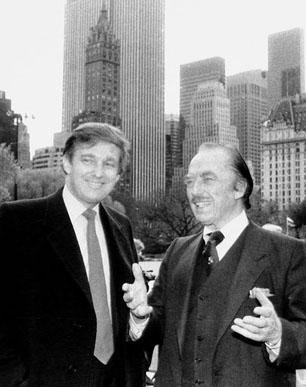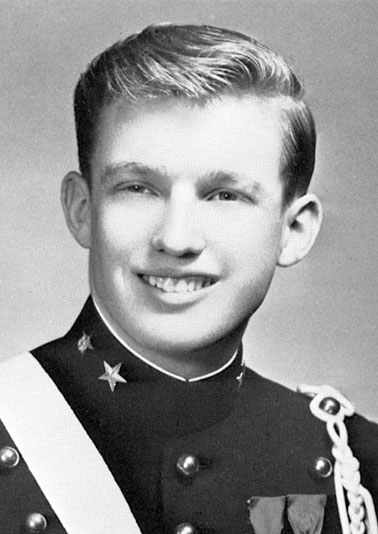This isn’t the first time Donald Trump has pretended to run for President etc
Oct 4th, 2016 | By Randall White | Category: USA Today
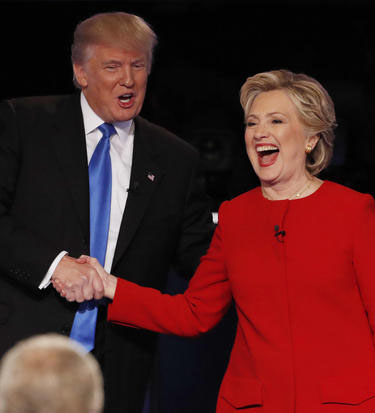
Donald Trump shakes hands with Hillary Clinton at conclusion of their first presidential debate at Hofstra University in Hempstead, New York, September 26, 2016. REUTERS/MIKE SEGAR.
I bumped into L. Frank Bunting at The Rex this past weekend. And he agreed that with Donald Trump’s possibly “Worst Week in Presidential Campaign History” now behind us, the US election campaign is looking a little less like “democracy as depicted by Hieronymus Bosch.”
(See his September 22 meditation on “Hieronymus Bosch back in land of free .. Commonwealth down .. Canada as US backdoor to Europe.”)
Yet Bunting went on, over a glass of red wine : “But has the spectre haunting Europe and the rest of the world really vanished? Trump’s support still seems quite robust. He still might win. Or he might come so close as to dramatically weaken the chances that a victorious Hillary Clinton could get much done anyway.”
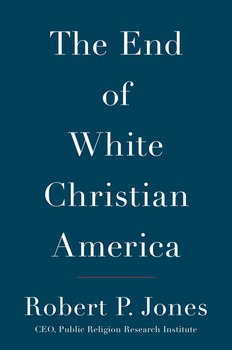 (And for evidence here Bunting phoned the office yesterday, to point out Éric Grenier’s latest polling averages for CBC News. As Grenier puts it : “After a rough few days for Donald Trump, the polls appear to be drifting back towards Hillary Clinton … But the evidence that the race has shifted dramatically remains relatively thin …”)
(And for evidence here Bunting phoned the office yesterday, to point out Éric Grenier’s latest polling averages for CBC News. As Grenier puts it : “After a rough few days for Donald Trump, the polls appear to be drifting back towards Hillary Clinton … But the evidence that the race has shifted dramatically remains relatively thin …”)
I have just stumbled across two items from the net that go some distance towards an answer to the comparative resilience of Trump’s support, despite his latest deadly stumbles, starting with the debate Hillary won more than a week ago now.
The first item is an August 31, 2016 PBS Newshour interview with Robert Jones, author of The End of White Christian America. (See, eg : “JUDY WOODRUFF: You’re explaining part of what’s going on in the support for Donald Trump.”) The second is a September 26, 2016 report from the Gallup polling organization, headlined “Voters Prefer Trump on Economy, Clinton on Most Other Issues.”
The current atmosphere has also prompted me to look a little further into the deep history of Donald Trump’s interest in American political leadership. I was inspired by a report on TV that casually alluded to Trump’s half-bid to become the presidential nominee of Ross Perot’s Reform Party in 1999—2000, on Bill Clinton’s bridge to the 21st century.
I started exploring Donald Trump’s earlier political dabblings more generally, using the remarkable resources on the net. The historical Donald Trump I found there seemed an at least somewhat more sympathetic character than the present-day Republican presidential candidate who haunts my television screen. And I wondered whether something of all this still survives for some US citizens – and still attracts supporters today????
Getting his feet wet with the Republicans in 1987—1988
It seems that Donald Trump first started thinking seriously about someday becoming President of the United States of America towards the end of the Reagan administration.
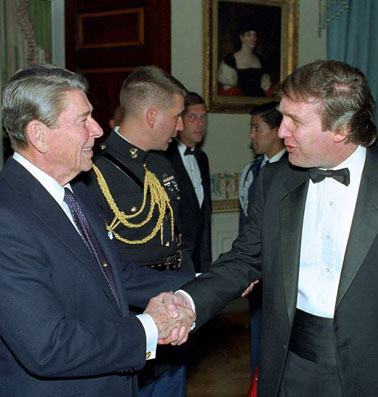
Donald Trump with President Ronald Reagan in 1987, when Trump first considered running for president.
As explained by a quite good Wikipedia article : “in the early summer of 1987 … Â Republican political organizer Mike Dunbar, unimpressed with the candidates for the 1988 Republican presidential nomination, founded the ‘Draft Trump for President’ organization.” Trump apparently liked the idea. He was a registered Democrat at the time, but “officially changed his registration to Republican in July 1987.”
In the fall of 1987 Trump began publicly expressing his “concern about the United States being ‘pushed around’ by its allies and proposed that ‘these countries that are ripping us off pay off the $200 billion deficit.’” Richard Nixon saw him on TV and sent an encouraging note. In November 1987 Trump’s book The Art of the Deal appeared. It soon “became a New York Times bestseller.”
In April 1988 Donald Trump appeared on Oprah Winfrey’s TV show. He “discussed his displeasure with the United States’ status as a ‘debtor nation’ and its seeming inability to compete with Japan.” But when Winfrey asked if he would ever run for president, he said : “Probably not, but I do get tired of seeing the country get ripped off … I just don’t think I have the inclination to do it.” He later attended the 1988 Republican National Convention. On TV he told  Chris Wallace and Larry King that he wouldn’t be running for president any time soon. But he stressed that if he ever did run, he would win!
Going in a little deeper with the Reform Party in 1999—2000
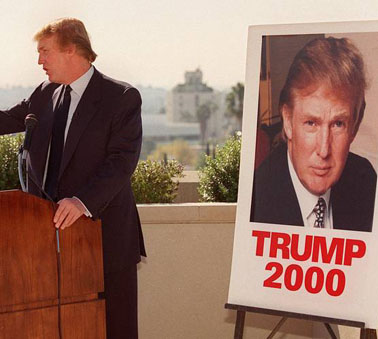
Donald Trump in Beverly Hills, Calif., in 1999, when he was contemplating running for president. PHOTO: CHRIS PIZZELLO/ASSOCIATED PRESS.
A decade or so later Trump’s presidential thoughts began to re-surface. In the spring of 1999 he met with writer Dave Shiflett, a contributor to the conservative magazine, The American Spectator.
The ultimate result would be “a book entitled The America We Deserve … a 304-page compendium of policy proposals for a theoretical Trump administration.” First published in the year 2000, it is still in 2016, some argue, “the most complete record that exists of the intellectual and policy foundations of the Republican party’s current standard bearer.” (Though see also “Zero-sum Trump … What you learn from reading 12 of Donald Trump’s books,” for a somewhat different point of view.)
Much of what is in The America We Deserve is similar to the policy thinking (or lack thereof) familiar to anyone who has been watching US TV over the past several months or even few years. As Dylan Matthews explains in “What you learn from reading 12 of Donald Trump’s books,” on some issues he has specific proposals that can change from page to page. But : “On the core issues he cares about the most – international trade, immigration, foreign policy – he’s strikingly consistent. He’s always been anti-immigrant, always been protectionist, always been fiercely nationalistic on matters of war and peace.”
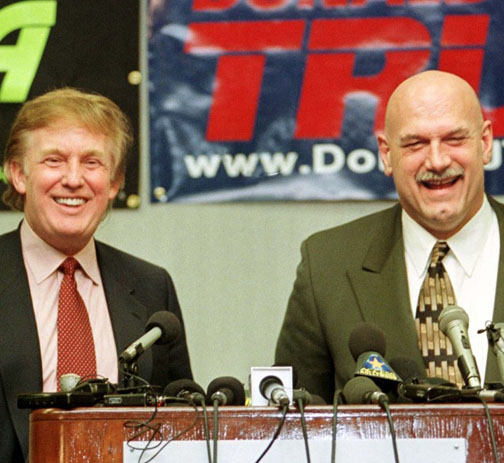
Donald Trump with Minnesota Governor Jesse Ventura at Reform Party fundraiser in Brooklyn Park, January 7, 2000.
Yet there are a few features of both The America We Deserve and Donald Trump’s 1999—2000 foray into actually running for president (briefly) that are somewhat different from what we have come to expect in 2015—2016.
From the standpoint of  practical politics, the quite good Wikipedia article explains how : “The New York Times reported that Jesse Ventura first approached Trump about a possible 2000 presidential run while both were in attendance at a wrestling event in Atlantic City” in 1999. Ventura was the former wrestler populist governor of Minnesota at the time – and a leading figure in what remained of Ross Perot’s Reform Party.
The Wikipedia article goes on : “Two months later, amid reports that paleoconservative political commentator and adviser Pat Buchanan was about to join the Reform Party to seek the nomination, Trump announced that he would consider running as a sign of respect for Ventura. He labeled the views of Buchanan as ‘prehistoric,’ and commented that even though he liked Pat, ‘I’m on the conservative side, but Buchanan is Attila the Hun.’”
The America We Deserve came out early in 2000, and by this point Donald Trump was more or less seriously running for the Reform Party’s presidential nomination, against Pat  Buchanan. While, as noted, anti-immigrant, protectionist, and fiercely nationalistic on matters of war and peace – just like today, the beginnings of his campaign also featured characteristics that have since (largely or much more?) vanished from the Trump political persona.
At this point in the year 2000, for instance, Donald Trump “was open to more government-intermediated solutions when it comes to healthcare–including giving serious consideration to a Canadian-style single-payer model … He also proposed something that looks a lot like the government-run exchanges that sit at the heart of the Affordable Care Act.”
And, as explained in The America We Deserve :”I would impose a one-time 14.25 percent tax on individuals and trusts with a net worth over $10 million…That would raise $5.7 trillion in new revenue, which would we use to pay off the national debt….We would save $200 billion in interest payments, which would allow us to cut taxes on middle-class working families by $100 billion a year.”
Finally, the Donald Trump who briefly ran for the Reform Party’s presidential nomination at the turn of the century also proposed a cabinet that would include Oprah Winfrey as Vice President, Colin Powell as Secretary of State, General Electric CEO Jack Welch as Secretary of Treasury, John McCain as Secretary of Defense, and Charles Rangel as Secretary of Housing and Urban Development! (And note that three in this top-five group are African American.)
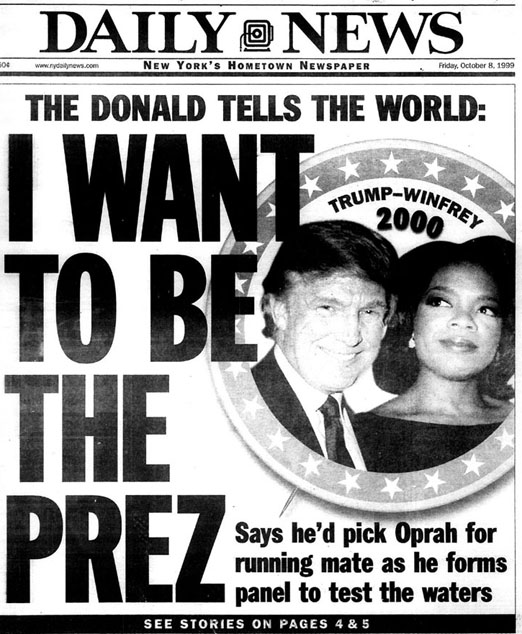 Alas, Ross Perot’s Reform Party was splitting into two antagonistic factions by early 2000. Increasingly, its future did not look good. Â As explained by Wikipedia : “On February 14, Trump withdrew from the race. In a press release, he cited infighting in the Reform Party as not ‘conducive to victory,’ concluding he could not win the election as the party’s nominee … He expressed concerns about the direction of the party … referring to David Duke, Pat Buchanan, and Lenora Fulani as a Klansman, a Neo-Nazi, and a Communist, respectively. … Trump lamented the exit of Jesse Ventura from the party, arguing ‘without Jesse, the Reform Party is just an extremist shell and cannot be a force or even a factor in 2000.’”
Alas, Ross Perot’s Reform Party was splitting into two antagonistic factions by early 2000. Increasingly, its future did not look good.  As explained by Wikipedia : “On February 14, Trump withdrew from the race. In a press release, he cited infighting in the Reform Party as not ‘conducive to victory,’ concluding he could not win the election as the party’s nominee … He expressed concerns about the direction of the party … referring to David Duke, Pat Buchanan, and Lenora Fulani as a Klansman, a Neo-Nazi, and a Communist, respectively. … Trump lamented the exit of Jesse Ventura from the party, arguing ‘without Jesse, the Reform Party is just an extremist shell and cannot be a force or even a factor in 2000.’”In 2015-2016 virtually all this more vaguely “liberal” side of the younger Donald Trump was  apparently washed out of his act, as a practical matter, by the pressures of running for the Republican nomination in the age of the hard right-wing tea party and all that. A recent Gallup poll, however, suggests that something of the earlier Trump hangs on in the American popular imagination : see “Trump Seen as Less Conservative Than Prior GOP Candidates.” And, as a final footnote on his Reform Party adventure of 1999—2000, note another recent Gallup report : “Americans’ Desire for Third Party Persists This Election Year.”
First and second thoughts in 2012 (and 2004 before that)
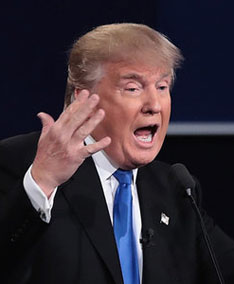 Intriguingly enough (and to cite the quite good Wikipedia article yet again) Donald Trump “changed his voter registration from the New York Independence Party (Reform Party affiliate) to the Democratic Party in August 2001 as the Reform Party continued its decline.”
Intriguingly enough (and to cite the quite good Wikipedia article yet again) Donald Trump “changed his voter registration from the New York Independence Party (Reform Party affiliate) to the Democratic Party in August 2001 as the Reform Party continued its decline.”
Even so, apparently while still registered as a Democrat : “Trump was critical of the George W. Bush administration’s handling of the Iraq War and publicly endorsed Bush’s impeachment. He considered challenging Bush in the 2004 Republican presidential primaries, but ultimately decided against it.”
Barack Obama’s victory in 2008 may have made clear that the Democrat party would not be a land of opportunity for anyone else for a while. In any case : “In 2009, Trump changed his voter registration from Democrat back to Republican.”
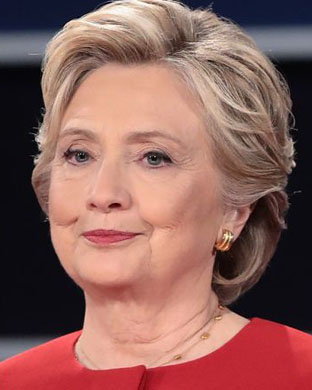 He then “seriously considered running for president as a Republican in 2012 and led in an April 2011 Rasmussen Reports survey.” It was at this point that he first “questioned the legitimacy of Obama’s citizenship and birth certificate.” Trump “decided not to run in May 2011, but proclaimed ‘I maintain the strong conviction that if I were to run, I would be able to win the primary and, ultimately, the general election.’”
He then “seriously considered running for president as a Republican in 2012 and led in an April 2011 Rasmussen Reports survey.” It was at this point that he first “questioned the legitimacy of Obama’s citizenship and birth certificate.” Trump “decided not to run in May 2011, but proclaimed ‘I maintain the strong conviction that if I were to run, I would be able to win the primary and, ultimately, the general election.’”
There was a final denouement : “After reports that a group in Texas was attempting to create the ‘Make America Great Again Party’ with the intention of running Trump as a candidate, Trump briefly considered a 2012 Independent bid and changed his voter registration from Republican to ‘I do not wish to enroll in a party.’”
In the very end, however, “he again decided against running. Trump re-registered as a Republican in 2012 and publicly endorsed Republican presidential nominee Mitt Romney for president.”
The Vice Presidents’ debate tonight
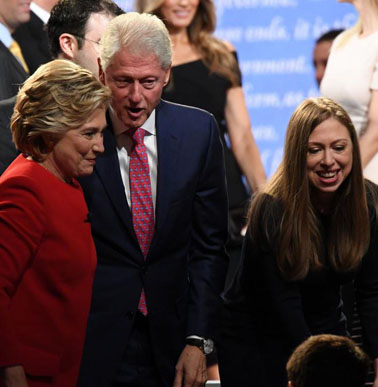 As I come to the end of these (for me at any rate) somewhat intriguing  gleanings on the vast complexities of American political culture today, the rest of the staff are watching the Vice Presidential debate in the office lounge, with its sumptuous couches and giant TV.
As I come to the end of these (for me at any rate) somewhat intriguing  gleanings on the vast complexities of American political culture today, the rest of the staff are watching the Vice Presidential debate in the office lounge, with its sumptuous couches and giant TV.
I have just looked in and the current verdict is that both Tim Kaine and Mike Pence are doing well.
Of course in this hotbed of mainstream media observation the feeling is that Tim Kaine is doing better. But no one seems to think that this is just a repeat of the first presidential debate on Monday, September 26. Mike Pence may not be giving the momentum back to Trump, the way Joe Biden is thought to have done for President Obama in 2012. But he is not doing as badly as Donald Trump did himself in the first presidential debate. (Or as Republican strategist Mike Murphy explained at the end on MSNBC, Mike Pence may have done much better for himself in the longer future, than he did for Trump this coming November 8.)
That at least is apparently how it looks from here, on the northwest shore of Lake Ontario, near the old Seneca village of Ganatsekwyagon, that arguably started the story of the modern city in the 1670s. And it seems a good note on which to end all the hasty remarks here. In what just may be as important and certainly intriguing a US election campaign as the TV keeps saying … Â It is finally starting to seem a little more interesting to me … And (I feel obliged to make clear) may the best woman win, of course … (Or, as long as there is no real chance of his actually winning, the political career of Donald Trump may finally be more interesting than even he thinks.)
